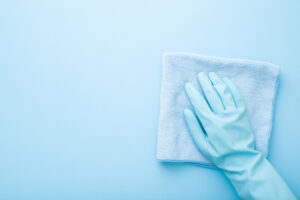Spring means warmer days, blooming flowers, and, for millions of people, increased dry eye symptoms. Unfortunately, when spring is in the air, so is pollen.
While you can be affected by dry eye any time of year, the spring season can make your symptoms even worse. It may seem like you cannot avoid pollen during the spring, but there are some ways you can help prevent worsening eye dryness.
By integrating a few simple practices into your daily routine, you can save yourself a lot of discomfort. Keep reading to find out how to improve your dry eye symptoms this spring!
Don’t Rub Your Eyes
When your eyes are itchy or otherwise irritated, it can automatically make you want to rub them. This is instinctual because rubbing your eyes can stimulate the production of tears to moisturize your eyes and flush out any irritants.

However, when you’re suffering from dryness, this only makes you feel worse. This is true of any time of year, but especially during the spring.
Pollen gets everywhere: on your car, on your clothes, and even on your hands. Whenever you touch your eyes, you risk introducing more irritants.
Aggressive rubbing can also cause friction that inflames the eyes. It can even lead to abrasions and other kinds of corneal damage.
In addition, the act of rubbing your eyes releases histamine. This chemical is what triggers an allergic response.
So, the more you rub your eyes, the more histamine you produce, magnifying your body’s allergic response.
Avoid Going Outside on Days with a High Pollen Count
Have you ever checked the weather and noticed that the pollen count is high? You may even see an air quality alert.
While no one wants to stay inside for the entirety of the spring season, you can steer clear of increased dryness by staying inside on the days with the highest allergy risk. By keeping an eye on the pollen forecast, you can avoid exposing yourself to the days when pollen peaks.
If you do need to leave the house on those days, try to limit the amount of time you spend outside as much as possible.
Wipe Down Surfaces Frequently

In the season of spring cleaning, it pays off in more ways than one to maintain a tidy environment. Just like dust, pollen can form a layer on surfaces throughout your home, whether your dining table or your desk.
It can even come off of your clothes and bags and transfer to the surfaces around you. You have probably seen how a yellow dusting of pollen can coat your windshield.
You don’t want that in your home, where you eat, sleep, and relax! Regularly wipe down furniture and other surfaces to keep them pollen-free.
It’s also a good idea to stay on top of washing your bedding and keeping your floors clean.
Keep Your Windows Closed
A warm breeze on a sunny spring day can feel refreshing, but not at the cost of your health and comfort. When you open your windows, even a few inches, you’re inviting pollen in.
Pollen particles are small enough to be able to come right through your screens and end up in contact with your eyes.
As much as you strive to maintain a clean home, it’s hard when there is a constant flow of pollen entering through your windows. To keep pollen out and your ocular dryness to a minimum, keep your windows closed.
Change Your Air Filter

When was the last time you changed your air filter? For some people, every few months is enough. However, if you suffer from allergies or your eyes are sensitive to allergens because of chronic dryness, you should change yours more often, at least once a month.
Your air filter traps all kinds of dust and debris, including pollen, stopping them from circulating in the air around you. When you go too long without replacing it, these harmful particles build up and continue to circulate throughout your home.
Changing your filter more often, especially in advance of the spring season, is one simple action you can take to reduce your dry eye symptoms. You can also consider placing an air purifier in the areas of your home that you spend the most time in, like your bedroom or if you work from home, your office.
This will improve your indoor air quality even more.
Get Treatment for Your Allergies

Unfortunately, many people suffer from both seasonal allergies and chronic dry eye. This can make springtime a nightmare, as pollen-induced allergies can cause dry eye symptoms to spike.
When both conditions are triggering eye irritation, it can leave you feeling awful. It only makes sense, then, that treating your allergies can stop your dry eye symptoms from worsening.
An over-the-counter allergy medication may be adequate, or you can talk to your doctor about your options.
Does dry eye seem to bother you no matter what you do? Let’s find a treatment that works for you. Schedule an appointment at Cheema MD Eye Care in Kingston, NY, today!



